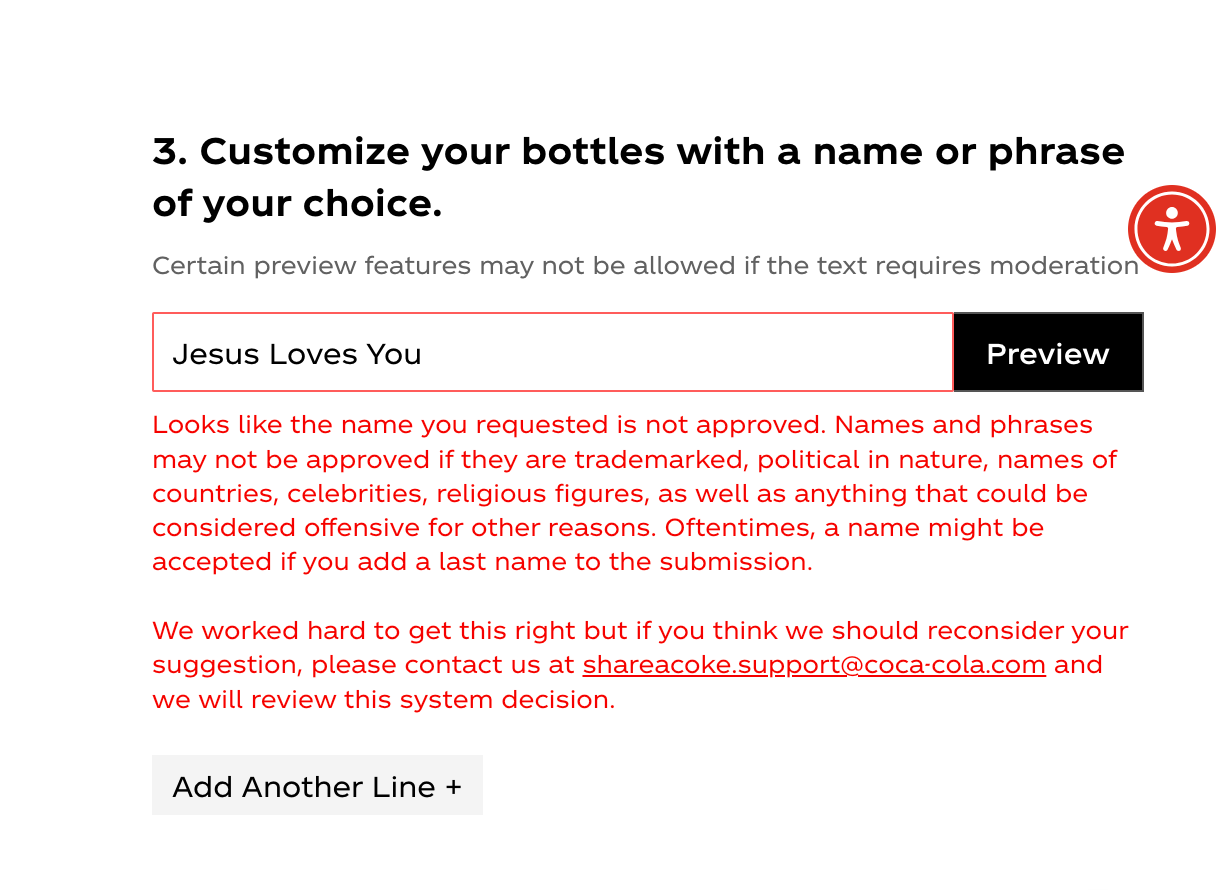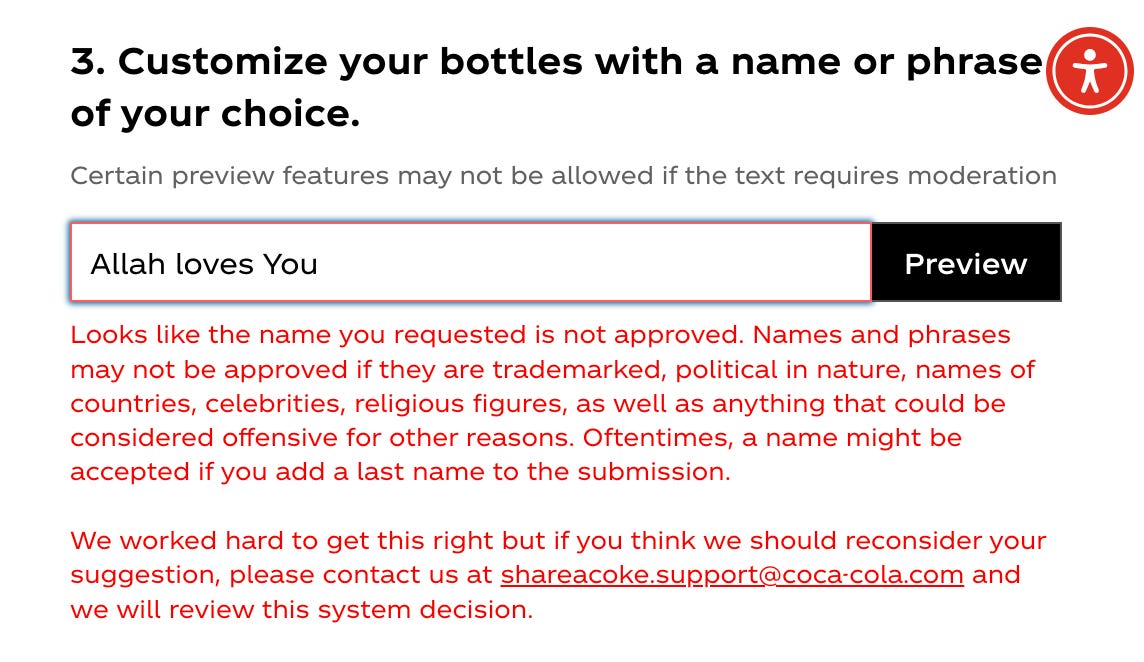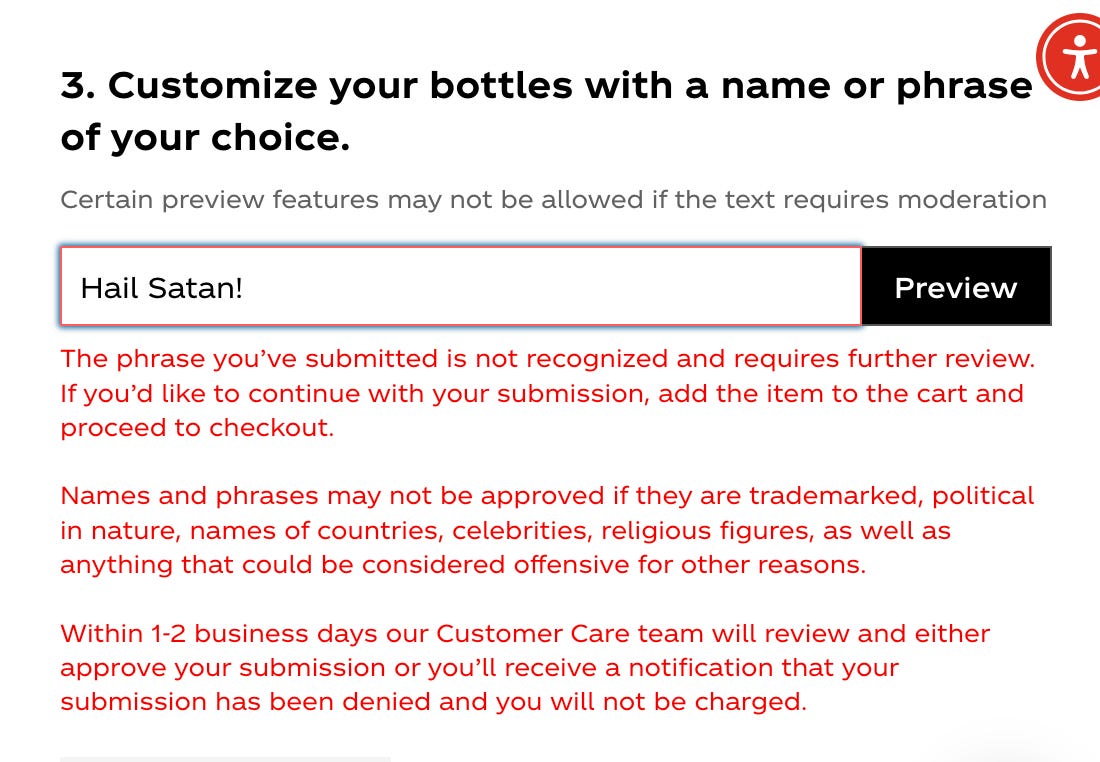Did Coke discriminate against Christians?
Or is this another example of a corporate own goal caused by failures in ham fisted management crippled by corporate "Groupthink"?
Well well well, another example of a corporate own goal that may have significant real world consequences. In this case it’s Coca-Cola.
In the United States you can, for a fee, personalise Coke Cans. There are machines that will sell you a can with your own message on it. You enter the message into a touchscreen and the can is printed for you in the machine. Coke also offer this service over their website.
All innocent enough, but in these days, when companies are so sensitive about their brand being associated with anything negative or perceived hateful, where they will bend over backwards to be ‘inclusive’, it’s not that straightforward. Coke realised if they were going to do this they would have to restrict some words, names and statements. People being people would happily requests cans with: ‘Coke is Sh!t!’; ‘tastes like monkey jXzz’ or ‘Mike Sucks Weiners’ etc on the cans so the company has used a bot to police and reject verboten words, phrases and names. You won’t be surprised to see that ‘Trump’ and ‘Kamala’ are both on this list.
A few days ago YouTube videos of customers using the machines came to light where they typed in ‘Jesus’ only to have the name rejected. Jesus is not only an anglicanised spelling of the Greek ‘Yashuah’ itself a hellenised version of the Hebrew ‘Yeshua’; it’s also a rather popular male name in hispanic societies across the Americas where it is spelled: ‘Jesus’ and pronounced ‘Heysus’.
“It’s Jesus at work’s birthday, he loves Coke, we’ll get him a can saying ‘Happy Birthday Jesus.”
“That’s strange, the machine won’t accept the word ‘Jesus’”
“I wonder…” types in ‘Allah’ - no problem. Types in Buddah - no problem. Types in Satan - no problem.”
“Allah loves you!” - $8.95 please
“Buddha Rocks!” - $8.95 please
“All HAIL SATAN!” - $8.89 please
“Happy Birthday J…..BLEEP! UNAPPROVED WORD DETECTED REQUEST REJECTED”
Here’s one of those videos
Coke Machine Wont Let you Personalize Can with Jesus but it Allows Allah and Others
Now given there are 2.5 billion practising Christians in the world, this ain’t going to end well for Coke, and, as more of these videos were posted online showing people having similar experiences, Coke clearly realised they were sitting on a potential powder keg of a backlash which may dwarf that which very nearly destroyed Bud Lite as a brand and saw it knocked off its perch as the world’s best selling beer in 2023. They wasted no time in acting and by the mid afternoon of Thursday 26th September 2024, they had updated their website and machines.
Any attempt to enter ‘Jesus’ brought up a new message explaining how certain religious figures, names associated with public figures, bad language and phrases were not allowed. But now entering ‘Allah’, ‘Jesus’ or ‘‘Buddha’ brought up:
Oddly enough, when you now ask the Coke site for a can with “Hail Satan!” on it, you get a different message:
Make of that what you will.
Is there an anti Christian conspiracy at Coke? No, I don’t think there is. It is a universal rule in my experience of 54 years in this rock that cock up always trumps conspiracy and this has every indication of the former. However, cock ups don’t manifest in a vacuum, there has to be a spark and an accelerant at some point to burn down Notre Dame so what happened here?
The most likely explanation is this: a junior employee is tasked with drawing up a list of words or phrases that Coke doesn’t want on its cans. That junior employee adds ‘Jesus’ and neglects, either through ignorance or deliberately, neglects to add: ‘Allah’; ‘Mohammed’; ‘Satan’; ‘Buddha’ and presumably ‘Zeus’; ‘Loki’; ‘Odin’ (Including the 100 and counting ‘Names of Odin and all their translations) and the entire list of every God, prophet or polytheistic deity currently worshipped.
So what are we dealing with here? Was this an activist employee? Well, perhaps but I suspect, this is a cock up, a failure in management and governance.
Such campaigns sit in the marketing teams of Fast Moving Consumer Goods companies like Coke, these teams are under huge pressure to come up with creative ideas and this is especially challenging when you are dealing with a brand that has done everything. So important is this that the brand marketing teams effectively run the commercial side of businesses like Coke.
That ‘Jesus’ is a fairly popular name in the American South doesn’t seem to have computed. That someone would enter it, react in surprise why it hasn’t been accepted, and then test other religious figures doesn’t seem to have been considered. I suspect that the list of banned words or phrases wasn’t reviewed or discussed at a senior level and I also suspect that no ‘what happens if?’ exercise was carried out. A failure to weigh the opportunity against risks.
Someone in a senior marketing position at Coke needs their backside kicked for not spotting the risk here. That no one considered the fall out of this is extraordinary. That no one spotted it indicates that there are not enough thinkers in the senior management team. This is a huge challenge for organisations, where homogenous political and cultural perspectives have been the result of DEI initiatives focused on immutable group characteristics and ignoring the cognitive diversity which is the only defence against groupthink.
In this case groupthink very nearly resulted in a global boycott and, may still cost Coke dearly as the response to such viral videos is always slightly delayed. So febrile is the atmosphere of the culture wars that Christians across the world are hyper sensitive to attacks and persecution, particularly when open attacks on their faith are shrugged off or gaslit as we saw with the Paris Olympic Opening Ceremony. So, despite Coke’s quick moves to address this, it is quite possible that this may still cost them dearly as the ‘benefit of the doubt’ is in short supply these days.
Questions remain: how did this slip through? Why didn’t our teams spot it? Are obvious but deeper questions need to be asked: how have we created a culture where we are insensitive to the lives of our customers to such an extent that no one spotted this? How cognitively diverse are our teams? Who is asking the awkward questions in meetings? Someone messed up here but what conditions created the conditions for that error to happen?







